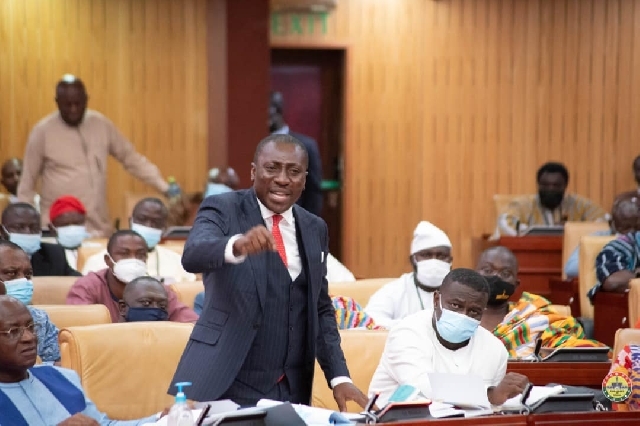SML-GRA deal: NDC’s call for prosecution unfounded – Majority caucus
 he majority leader urged the main opposition not to kill Ghanaian businesses
he majority leader urged the main opposition not to kill Ghanaian businesses
The Majority in Parliament has rejected demands by the main oppostion National Democratic Congress (NDC) for the prosecution of individuals linked to the SML-GRA contract, dismissing the requests as unfounded.
Members of the Majority caucus argued that there is insufficient evidence to implicate any government official in causing financial loss to the state, thus deeming calls for prosecution unjustified in the SML-GRA deal.
Speaking to journalists, the Majority Leader, Alexander Afenyo-Markin, emphasised President Nana Addo Dankwa Akufo-Addo’s decision to launch a thorough review of the contract, highlighting its alignment with the public’s best interests.
“Now we are aware that our friends in the NDC are calling for certain prosecutions. I think that they have not paid attention to the whole issue and they only want to do politics as usual. Their call is unfounded for the simple reason that there isn’t any established proof of any officer of state causing financial loss to the state.
“Indeed what they think are payments to SML are not payments borne out of the government’s revenue. If you peruse the agreement, SML is paid out of what it generates and they would have to pay attention to the details. They are paid 0.05% per litre of revenue that they generate as a result of the system that they put in place to monitor activities in the petroleum sector.”
The majority leader urged the main opposition not to kill Ghanaian businesses.
He continued that: “It is instructive to also note that his company opened its doors to the Mines and Energy Committee to inspect and to see the nature of their operations. What I want to urge our colleagues in the opposition is that they should not kill Ghanaian businesses.”
He added: “Often under the guise of due diligence and ensuring that there is transparency, we often get out of control and destroy Ghanaian companies, whereas foreign ones who operate in certain sectors get a kind of protection that makes them develop their business but often Ghanaian businesses suffer.”
.
Source: classfmonline.com/Elikem Adiku
Trending News

Kasoa-Weija road floods: We didn’t have money to fix it– Asenso-Boakye
07:02
EC corrects voter roll errors
12:20
I've had unprecedented achievements as Vice President -Bawumia
12:24
Franklin Cudjo’s allegations that we disenfranchised SALL ‘false’ – EC
07:03
Cecilia Dapaah case: EOCO’s corrupt conduct must be probed – Adam Bonaa
12:00
Bawumia’s campaign is akin to a comedy show - Osman Ayariga
10:04
C/R: We demand immediate action on Kasoa-Winneba road traffic – NDC tells Akufo-Addo
07:03
Lawyers in shock, disbelief as Chief Justice reconstitutes, chairs Opuni case panel
10:59
Bono East NDC roasts Bawumia over misleading promises
09:40
Nurse allowance: ¢177m coming Thursday to clear arrears – Bawumia
11:35




